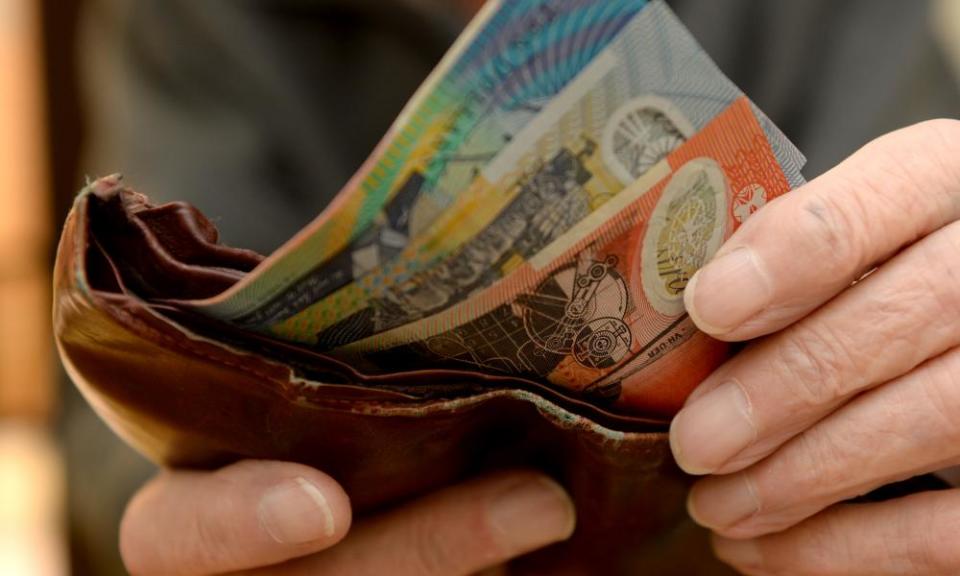Covid supplement end will mean being pushed further into poverty, Australia's jobless warn

Unemployed Australians have warned a parliamentary inquiry examining the Morrison government’s jobseeker bill that the end of Covid-boosted welfare payments will plunge them further into poverty.
Guardian Australia revealed last month the government plans to lift the base rate of jobseeker, parenting and student payments by $50 a fortnight, or $3.57 a day, but the change is seen by many as a cut because a $150 coronavirus supplement will be scrapped at the end of March.
A Senate inquiry, which will hold hearings on Tuesday, has received more than 500 submissions, including dozens of personal pleas from welfare recipients who will be affected by the bill, including one as young as 16.
Related: Why jobseeker is stuck 'in the early 90s' and leaving Australians behind
Many warned the effective cut to welfare payments would leave them unable to afford food, medication and even housing.
One jobseeker, aged 59, who had been on the payment for 15 months and previously worked in the community sector, said they had been rejected from 157 jobs. This did not include employers who simply did not respond, they said.
“There have been days when all I have to eat is a boiled potato and a sliced tomato,” the person said.
“Once a fortnight I treat myself to two oranges and two grapefruits. I usually ration them, only eating half a fruit at a time. A half an orange is like a revelation to me sometimes, something to be cherished.”
The person said they had been forced to quit their private health cover and when the $50-a-fortnight increase was announced by Scott Morrison they had cried.
Under the government’s bill, the jobseeker payment – excluding rent assistance and other supplements – will be reduced from $715.70 a fortnight for a single person to about $630 a fortnight on 1 April.
However, people under 22 years old who are on youth allowance, or are in a couple, receive a lower rate.
Many older jobseekers – including several who declared health issues and warned they would struggle to afford their medication – said the small increase would consign them to years of poverty because they were unlikely to gain work given the current economic situation.
Related: The ‘jobdobber’ hotline is another policy aimed at keeping wages low | Greg Jericho
Their situation would only improve when they became old enough to receive the age pension, they said.
One welfare recipient, an executive who lost their job during Covid, said they were forced to deplete their savings before they could start receiving jobseeker payments in December.
The person has deferred their mortgage, was now choosing between groceries and medication to treat a mental health issue, and had cancelled their health and home and contents insurance.
They also claimed they were forced to have their cat put down because they couldn’t afford a required treatment.
Several jobseekers told how the government’s decision to initially increase the jobseeker payment by $550 a fortnight last year had briefly changed their lives.
“During Covid, I have been able to go to the dentist, get spectacles and hearing aids, and buy new socks and underwear because I could finally afford these necessities,” a 65-year-old single woman, who had been out of work eight years due to ill health, said.
“The meagre increase to jobseeker suggested by the incumbent federal government will not change my circumstances one iota. The end to the Covid supplement will plunge me back into dark times indeed.”
A jobseeker in Rocklea, Queensland, who could “barely afford” a rental property they said was “falling apart with exposed asbestos” said the reduction to “$44 a day” meant they would “have to miss meals to catch public transport to go to my mandated in-person meetings” with their employment services provider.
The government’s $50-a-fortnight increase fell well short of proposals from groups such as the Business Council and Deloitte, as well as welfare groups such as the Australian Council of Social Service and the Australian Unemployed Workers Union.
One mother-of-two from NSW told the inquiry she was worried about feeding her children after March.
“I rent a property costing $400 a week and attend university,” she said. “It’s a real struggle trying to survive on a rate of jobseeker that is so far below the poverty line.
“The constant stress of keeping a roof over my family’s head, struggling with water and electricity bills, and lying to my kids about whether I had eaten that day.”
Another 43-year-old single woman from rural South Australia said she was unable to have a social life even on the current boosted rate of welfare payments.
“Whenever I am invited to things I tend to make excuses as I can’t afford it and I am ashamed,” she said.
“Life sucks enough as it is when you are unemployed but when the government takes away the remaining $150 corona supplement and then increase jobseeker by $50 it will suck a lot more.”
The inquiry also received several submissions from young people on youth allowance payments.
One 16-year-old, who had been kicked out of home last year “for reasons that were beyond my control”, said they were now living in a share house they could barely afford.
“I have had to many times skip meals just to be able to afford other bills such as school expenses or rent,” they said.
“The stress of having to worry if I will be able to survive has made my anxiety and panic attacks so much worse.”
The inquiry will hear from welfare and advocacy groups, social and economic policy experts and the Department of Social Services on Tuesday.

 Yahoo Finance
Yahoo Finance 